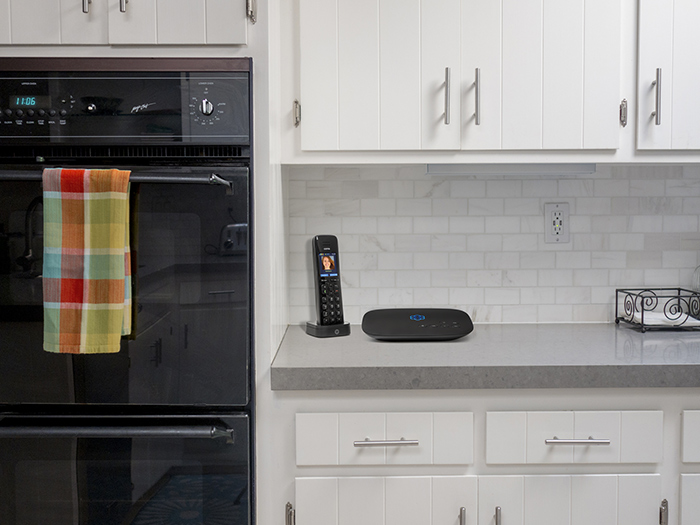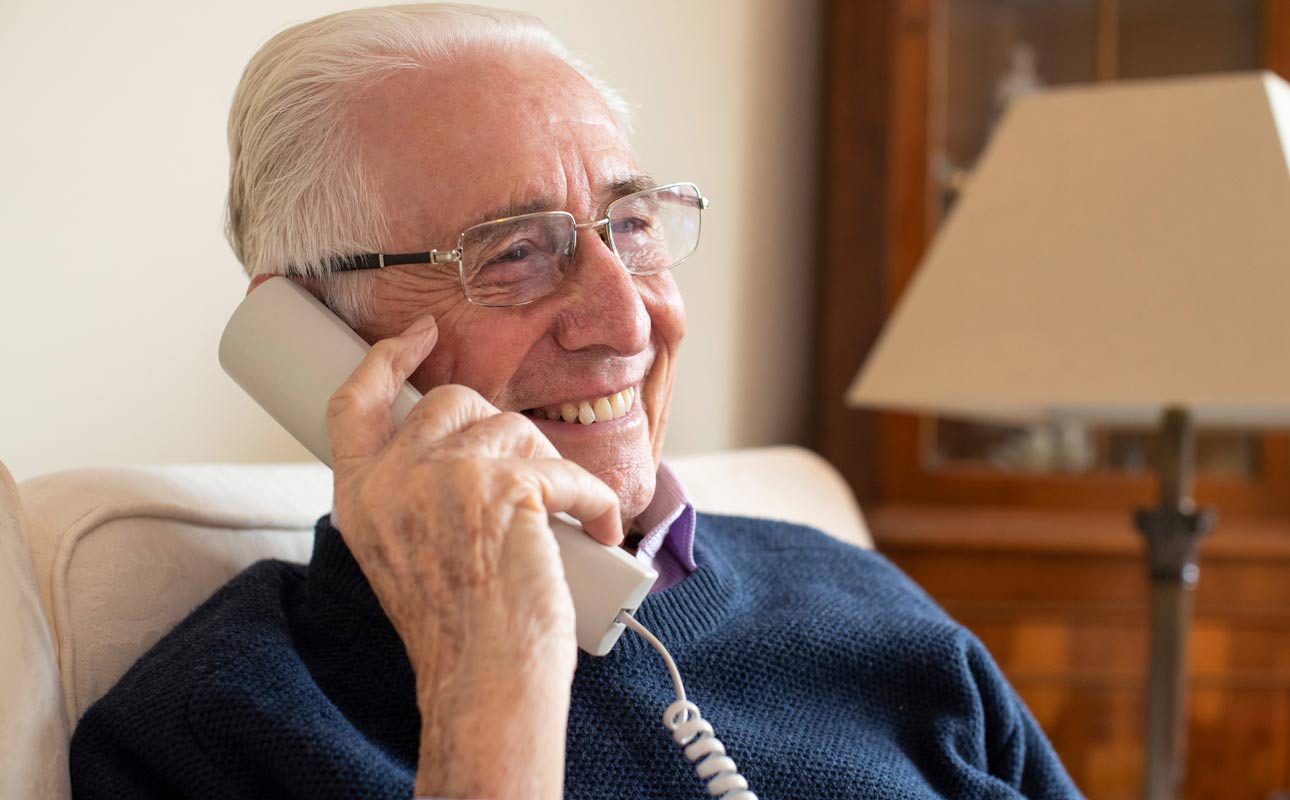Low-cost landline alternative for seniors

It’s challenging to find senior home phone services that are low in cost, easy to use, and offer a comfortable level of technology. Ooma Telo is a residential Voice over Internet Protocol (VoIP) phone service that’s an effective low-cost landline phone alternative for seniors. As you’ll find out in this senior’s guide to VoIP phones, it meets the trifecta of being affordable, easy to use, and manageable by a savvy senior or remotely by a family member.
What is a VoIP phone?
VoIP phones transmit calls securely over your internet connection rather than via traditional copper telephone lines.
While residential VoIP services differ in their offerings, a standout aspect of Ooma Telo is that users can have a traditional home phone experience, just like a landline. There are no high-tech protocols or unruly gadgetry. Users looking for a landline replacement will have a seamless transition, simply using their existing home phones and placing calls as they usually would.
Benefits of VoIP home phone for seniors
The VoIP technology working behind the scenes provides significant advantages over traditional home phone services for elderly.
Features: Traditional phone providers typically charge extra fees for individual add-ons such as caller ID or call waiting. Ooma Telo provides all customers with a robust set of features that adds up to powerful phone service at no extra cost.
Use your existing phone: Ooma Telo works with your existing wall phone, desk phone, or cordless phone. When you’re ready to add additional functionality, you can upgrade to the Ooma HD3 Handset, an IP phone with HD audio, and more.
Alternative to the deteriorating phone network: If you live in one of the 20+ states where phone line maintenance is no longer required, you may experience call quality decline and service lapses. VoIP phones are a smart alternative, relying upon the newer internet-utility infrastructure.
How much does it cost?
Ooma Telo is truly a low-cost home phone service for seniors. Getting started begins with an upfront hardware purchase of $99.99. This device provides customers with telephone call quality that far exceeds the competition at low monthly rates that can add up to big savings.
Ooma offers two levels of phone service. Ooma home phone service is the ultimate low-cost calling plan, generally costing between $6 to $9 per month in taxes and fees depending on your postal code for the Basic service plan. Unlimited U.S. calling as well as a wide set of calling features are included.
Customers looking for additional features can subscribe to Ooma Premier for just $9.99 per month plus required taxes. This service plan adds unlimited calls to Canada, Mexico, and Puerto Rico as well as features such as Instant Second Line, three-way calling, custom ring patterns, voicemail tools, and smart home integrations.
Especially useful for seniors who are often targeted by telemarketing scams, Ooma Premier offers a comprehensive set of call-blocking tools to fight back against robocallers.
How much can you save?
When we compared Ooma Basic to traditional landlines and cell phones, the cost comparison reveals that even after the hardware purchase, Ooma customers are saving money.
In the first year, customers who switch from a traditional landline to Ooma Telo can save an average of 73 percent, or about $396. In subsequent years, when no hardware purchase is required, average savings are 91 percent off traditional landline rates.
Comparing Ooma Telo to the $2,464 average cost for an unlimited cell phone data plan, the savings are also significant. Switching to Ooma would save you up to 94 percent. That’s over $2,300 a year! That’s one of the least expensive home phone plans for seniors on the market today.
You can find out how much you’d save by using our phone savings calculator.
Keep your phone number
In addition to Ooma’s many home phone features, seniors will appreciate the ability to keep their phone number after switching phone service providers. This is useful for the practical reasons of not wanting to notify contacts, a senior’s concerns about memory lapses, or the sentimentality of having had the same phone number for decades.
Included with an annual subscription to Ooma Premier is free number porting, which allows you to transfer most phone numbers to Ooma. Without a subscription, porting a phone number costs $39.99.
Porting is a one-time occurrence and doesn’t incur fees in future years. Use Ooma’s phone number checker to see if your number can be transferred.

Advanced 911 for emergencies
A key consideration for seniors is access to emergency services. While landlines provide a reliable way to call 911, emergency calls from mobile phones can be problematic.
Across the country, emergency systems face challenges when geolocating cell phone callers with failure rates as high as 90 percent in Washington D.C. and 66 percent in Texas. However, in the Ooma report on 911 access, we found that the majority of people are unaware of these limitations.
Ooma provides a smart solution with advanced 911 service so users have essential communication features during an emergency. With Ooma, a 911 call will automatically be routed to your local dispatcher, rather than to a national call center. Additionally, the registered home address will automatically be transmitted to the dispatcher so the location of the emergency will be known, even if the caller is unable to speak. Keep in mind that emergency operators use your registered address to determine your location. If you use Ooma service somewhere other than your registered address, you should register the additional locations, too.
Ooma’s 911 tools can also keep family in the loop with 911 alerts. This function immediately sends a text message to your cell phone if 911 has been dialed from an Ooma phone. Whether there’s a problem or it’s a false alarm, the 911 alerts feature lets you respond accordingly.
Protect against utility outages
Some critics may caution against seniors switching to VoIP phone services because its functionality is dependent upon your electric and internet services, meaning that a power or internet outage could also result in a phone outage. Ooma can mitigate these risks.
If you have the Ooma Premier plan, the Ooma Telo LTE Safety Phone, can transmit a phone call via an advanced nationwide LTE network. Therefore, if your internet service goes out, the device will automatically reroute calls from your traditional internet connection to a cellular one. This provides seamless connectivity to make and receive calls without needing to manually switch the connection type.

For electricity outages, the Ooma Telo Battery Backup keeps your system powered up even when the lights go off. If your Ooma Telo stops receiving power from the electrical outlet, it’ll automatically switch to run off the battery. Once power is restored, the Telo will switch back to the traditional power supply and recharge the battery.
Smart home for safety
Smart home technology is expanding to eldercare, as explained in a WSJ audio podcast. For example, consider how a family member may want to monitor a loved one remotely with smart home security sensors.
An advantage of Ooma Telo is that the VoIP phone service can also integrate with the Ooma Smart Security platform. While many households use the home security network to monitor their own house, it can also be used to monitor a family member’s house remotely via a mobile device. Available security sensors include door/window sensors, motion sensors, a garage door sensor, water sensors, and a siren.
What to look for in a VoIP service for the elderly
Picking the best home phone service provider is an important decision. Although VoIP is an ideal low-cost phone service for seniors, not all providers offer equal benefits and affordability. Here are a few things to look for when shopping for a provider.
Strong reputation
Harness the power of internet reviews. Customers eagerly share their experiences (good and bad) online. Look at what customers say about voice quality, customer service and hidden fees. A home phone service provider for seniors should deliver stellar service and make it easy to get help when needed.
Easy-to-contact customer support
There’s nothing more frustrating than waiting on hold for hours to get help. Home phone services that cater to seniors should offer well-staffed, live customer phone support. Before committing to a VoIP provider, test them out by calling their customer support line to see what kind of experience you have.
No contracts
Getting roped into a long-term commitment is unnecessary. The best VoIP providers don’t try to corner you into an extended service contract. Many VoIP providers offer flexible month-to-month plans.
Ooma VoIP is an exceptional low-cost landline alternative for seniors
Getting started with Ooma residential telephone service is easy. The Ooma Telo hardware is risk-free with 30-day returns, and users tell us that it only takes about 20 minutes to set up. Additional system configuration can even be done remotely by a savvy relative via the My Ooma portal.
Ooma Telo is a great landline alternative, helping seniors spend less for phone service while also providing additional features, advanced 911 service, and connectivity tools for family members.



